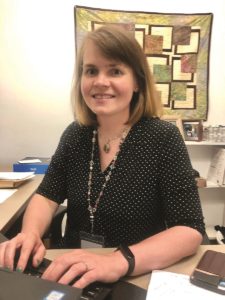PROVINCETOWN — Outer Cape Health Services has begun offering a form of intensive outpatient treatment to help people with addiction disorders.
The Structured Outpatient Addiction Program, or SOAP, provides group counseling three days a week from 9 a.m. to 12:30 p.m., along with individual counseling and case management. The program is the most intensive form of treatment for addiction short of residential care.
Across its three clinics — in Provincetown, Wellfleet, and Harwich — OCHS currently has 14 therapists, nurses, and social workers providing mental health and addiction treatment, said Gerry Desautels, the organization’s chief of communications. In spite of retirements and turnover, OCHS has had a net gain of two mental health and addiction professionals, said Meara Baldwin, the new OCHS director of behavioral health.

This is good news, given that statistics show Covid has worsened addiction struggles. Massachusetts had a record number of opioid overdose deaths in 2020, with 2,104 fatal overdoses. And the need for mental health care exceeds the supply of therapists. OCHS has a waiting list for therapy appointments of one week to several months, depending on the particular case, Desautels said.
The addiction programs, however, are all accepting new patients, he said. In addition to SOAP, OCHS has 200 clients receiving the opioid agonist buprenorphine or the medicine Vivitrol through its office-based addiction treatment program at all three of its clinics. Twenty-five other patients get recovery coaching.
Given that OCHS is the only provider of addiction services for the region, it is hard to compare its services against those of other facilities. But Dr. Ruth Potee, an addiction advocate, former primary care doctor, and medical director at the Behavioral Health Network in Western Massachusetts, said Outer Cape Health offers the same or better care for addiction as other federally qualified health centers in Massachusetts. Other states where addiction is generally more stigmatized do not offer this much help, she said.
Federal funding is now flowing to support substance abuse treatments such as those offered at OCHS, Potee said. That is because the current public health consensus is to bring addiction care under the same roof as primary care medicine. The idea is to normalize it, Potee said.
“You should be able to get treatment for strep throat or for your substance use disorder in the same place,” she said.
A “financial game changer” for OCHS has been a recent 50-percent increase in reimbursement from MassHealth, the state’s health insurance program for low-income or uninsured residents, Baldwin said. The increase applies to medical, behavioral and mental health, and dental treatment, she said.
Virtual therapy, addiction, and medical appointments are also now covered by insurance. These are all major improvements for health clinics, Baldwin said.
Twenty-five percent of primary-care patients are covered by MassHealth at OCHS, as are one-third of behavioral health patients, she said.
The addiction services at OCHS now run the gamut from medical assistance, to one-on-one counseling with a coach, to three-hour group meetings. But Potee said OCHS is missing one piece of the addiction treatment puzzle: a mobile methadone van. The federal government recently allowed the licensing of such vans to bring methadone to rural areas, Potee said.
The nearest methadone clinic is in Yarmouth, where patients must drive daily to take their doses in the office, according to federal law. Methadone is the preferred medication for opioid addiction, Potee explained, because the main street drug, fentanyl, is so strong and lingers for so long in the body that drug users must wait for six days to be drug-free enough to ingest buprenorphine and Vivitrol without going into instant withdrawal.
Even though public health officials recognize the importance of access to methadone, the Outer Cape, like much of the rural U.S., is in a methadone desert, Potee said. But that could change. Her agency is about to open one of the first methadone clinics in a primary care office at the Community Health Center of Franklin County, she said.
Currently, OCHS has no plans for any type of mobile treatments, Desautels said.
